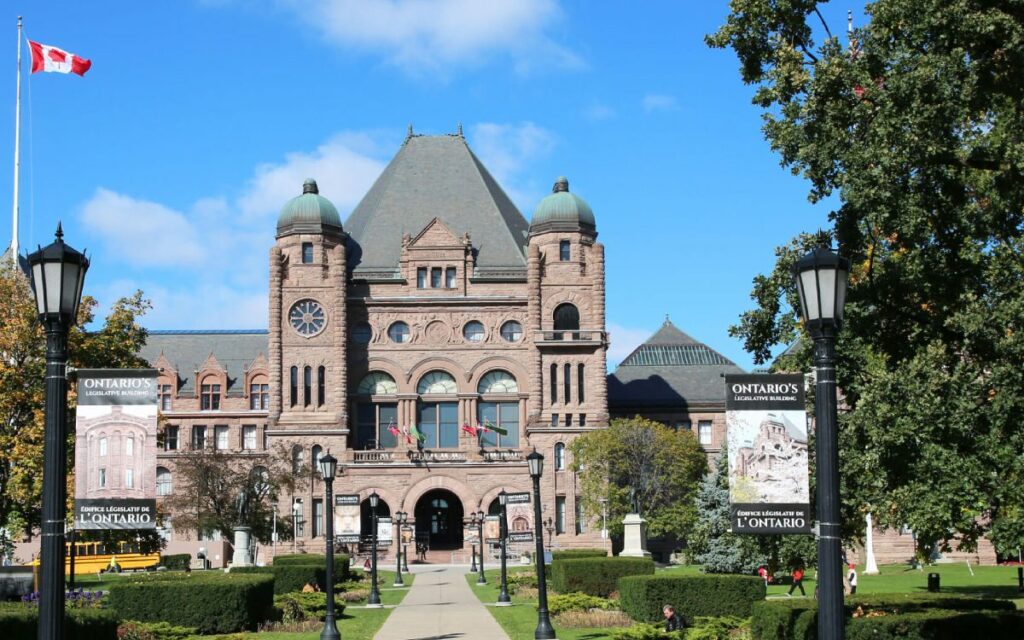
There is a long-standing rule in the Legislature that MPPs are not allowed to wear visible symbols in support of controversial or political issues. Photo Credit: Legislative Assembly of Ontario.
The divisive ripples emanating from the Middle East war between Hamas and Israel continue to spread. This past week it hit the Ontario Legislature.
MPP Ted Arnott, the long-time Speaker of the House, issued a ruling that the wearing of the distinctive black and white headscarf, the kiffeyah, would not be allowed in the Legislature.
The scarf, long considered a cultural symbol of Palestine and its supporters, has, since the atrocities committed by Hamas against the Israeli people on October 7th, become a highly politicized symbol for pro-Hamas supporters.
There is a long-standing rule in the Legislature that MPPs are not allowed to wear visible symbols in support of controversial or political issues. If an MPP wants to wear clothing or symbols that celebrate particular days or support other causes like a local sports teams or a cancer awareness campaign, he or she must seek the unanimous consent of the House to do so. It is frequently given in such circumstances for symbols that are not seen as promoting overt political messages.
But Independent MPP Sarah Jama, a highly vocal supporter of Hamas and well-known for her anti-Israel views, had taken to wearing the scarf. This prompted another MPP to complain to the Speaker’s office, prompting Arnott to issue his ruling.
Arnott was well within his rights as Speaker to do so. It is his job to run the affairs of the Legislature, the building within which it sits and to try and maintain some sense of decorum and civility within the chamber itself during debates. Most members of the public who watch the daily Question Period will recognize the individual in the black robes, standing on his feet yelling “order, order” at rambunctious MPPs.
His ruling resulted in considerable controversy with some calling it divisive and some questioning his right to make the decision, claiming the scarf is merely a historical cultural symbol.
Really? How anyone can watch the near riots and disruptive demonstrations by Hamas supporters that have become commonplace in our province and around the world and still maintain that view is a stretch.
This writer has seen news coverage of demonstrations where individuals not wearing the distinctive scarf were immediately identified by protesters as opponents to be physically harassed and driven from the scene.
As Arnott clearly stated, the wearing of the head scarf has changed from a cultural symbol to a highly emotionally-charged political statement, and hence, should not be allowable in the Legislature according to the rules.
However, like everything else this issue touches, matters only got worse when all four party leaders, including Premier Doug Ford, publicly demanded that the Speaker reverse his ruling.
Arnott again, quite rightly responded that as Speaker, he is also a servant of the Legislature and if MPPs wanted to overrule him they could do so by asking for a motion of unanimous consent to allow the head scarf to be worn.
Stiles moved such a motion asking for consent, but several MPPs, most visibly PC MPP Robin Martin vehemently objected, so the motion died, leaving Arnott’s ruling intact. Another PC MPP, Natalie Kusendova-Bashta stormed out of the Legislature according to media accounts, upset that her colleagues had not supported the motion.
What happens in the coming days in the Legislature is anyone’s guess. But it is an object lesson on why such long-standing rules are necessary to try and protect our ability to have civil discourse on weighty matters of great controversy. To work, they must be enforced even-handedly. Once you start making exceptions, where does it stop?
As Toronto Sun columnist Brian Lilley noted, it is hard to imagine that any MPP would be allowed into the Legislature wearing one of controversial former President Donald Trump’s distinctive red “MAGA” hats or a shirt demanding that Hamas surrender the Israeli hostages they captured during that infamous October 7th massacre.
Whether this issue dies a quick death because of Arnott’s ruling, or whether it stumbles on as a distraction from the business of the Legislature, remains up in the air, but one can only hope the Speaker’s ruling with prevail.

Janet Ecker is a former Ontario Finance Minister, Minister of Education, Minister of Community and Social Services and Government House Leader in the governments of Premier Mike Harris and Premier Ernie Eves. After her political career, she served as the founding CEO of the Toronto Financial Services Alliance, a public-private partnership dedicated to building Toronto region into an international financial centre. She currently sits on a number of corporate and non-profit boards, agencies and advisory committees.
Ms. Ecker received the Order of Canada for her public service contributions and was recognized as one of the “Most Influential People in the World’s Financial Centres” by Financial Centres International. She also received a “Canada’s Most Powerful Women: Top 100 Award” from the Women’s Executive Network and the Richard Ivey School of Business, among other awards. She is also one of the founders of Equal Voice, a national, multi-partisan organization working to elect more women.




















